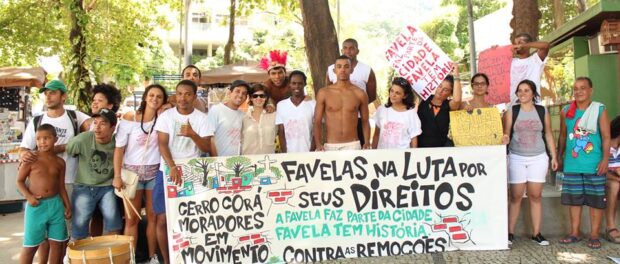
On July 22, one of the most read local newspapers in the United Kingdom published an article comparing overcrowded student accommodation in Birmingham to “Third World Shanty Towns.” Local politicians commented that one Birmingham district was beginning to look like a “Brazilian favela.” The area in question was also described as “crammed” and “litter strewn” with “Amazonian back gardens.” Although the majority of English-language reports on Brazil during the intense media spotlight of the World Cup translated the word ‘favela’ to ‘slum,’ this brand of lazy journalism is especially surprising coming from the Birmingham Mail. Birmingham has its own unique housing history: during the Industrial Revolution, many of the city’s working class communities lived in cramped and squalid slum complexes, which existed in inner city areas well into the 1960s.
Despite the fact that Birmingham has its own history of ‘Back-to-Back’ tenement neighborhoods, its politicians chose to use the term ‘favela’ to describe overcrowded student accommodation. Its journalists, in turn, chose to further publicise these comments that perpetuate the deeply damaging favela stigma. This is a prime example of the stigma’s infiltration in the international media’s representation of favela communities. Favelas are not slums because they do not by definition include the hallmarks of temporary settlements, cramped living conditions, and water insecurity. They often begin with such conditions, but have evolved over decades and generations into communities with a number of qualities. Actually, the characteristics of favelas are pretty straightforward. Favelas are:
- Neighborhoods that emerge from an unmet need for housing.
- Established and developed with no outside or governmental regulation.
- Established and developed by individual residents (no centralized or outside ‘developers’).
- Continuously evolving based on culture and access to resources, jobs, knowledge, and the city.
The term ‘favela’ has no inherent negative connotation. The negativity attached to these communities is often imposed by outsiders with little or no knowledge of favela life. These perceptions influence exclusionary urban planning policies. Many favela residents are fighting against eviction from their homes and have been struggling for formal recognition of their housing rights for decades. Conflating the term ‘favela’ with the word ‘slum’ negates the vast range of community qualities, the historic role of favelas in building the city of Rio de Janeiro and others across Brazil, and their potential to contribute to a sustainable model of future urban development. It is essential to #EndFavelaStigma in order to recognize the efficiency created through favela-style development.
These low-rise, high density neighborhoods encourage exchange rather than isolation. Due to limited financial resources, residents have historically worked together to guarantee everything from daycare to housing. By 2050 one-third of the world’s population will be living in informal urban settlements. Contrary to what the Birmingham Mail and its city’s politicians seem to imply, favelas offer a key insight into strategies for inclusive citizenship in the 21st century. Birmingham would be lucky to have Britain’s first favela.


